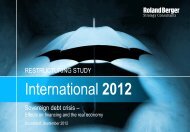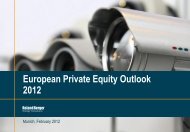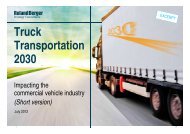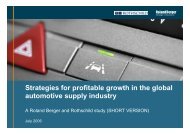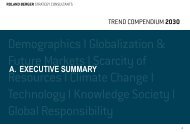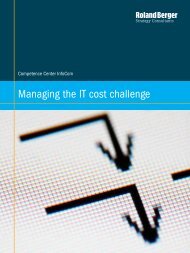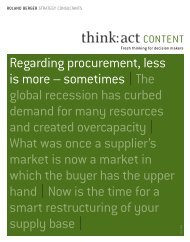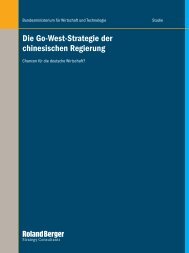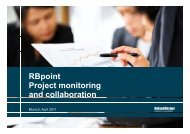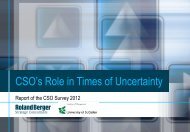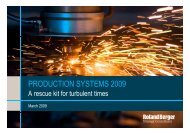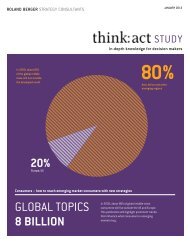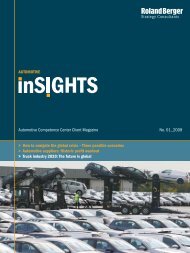issue 1 - Roland Berger
issue 1 - Roland Berger
issue 1 - Roland Berger
You also want an ePaper? Increase the reach of your titles
YUMPU automatically turns print PDFs into web optimized ePapers that Google loves.
DOSSIER #01 Trust<br />
Hilti Chairman Michael Hilti (left),<br />
Renault CEO Louis Schweitzer: “It’s extremely<br />
important to demonstrate trust and<br />
confidence in the abilities of employees.”<br />
organization should be executed as if it were a<br />
change management process, with responsibilities<br />
assigned and plenty of freedom given to employees.<br />
Schwenker believes that the following six<br />
action areas are central to this:<br />
p<br />
excellent leadership,<br />
joint formulation of strategy,<br />
transparent corporate governance,<br />
decentralized organizational structure,<br />
trust-enhancing personnel work, and<br />
fair performance evaluations.<br />
SKEPTICS, WHO CONSIDER the hard work<br />
involved in dealing with soft factors a complete<br />
waste of time and money, might rethink their position<br />
after taking a look at the small Alpine state of<br />
Liechtenstein. The biggest company in the principality,<br />
the international construction supplier Hilti AG,<br />
has been working on its corporate culture for the<br />
last 20 years. “The fact that we have always paid<br />
attention to people and corporate culture has nothing<br />
to do with philanthropy, but instead is one of<br />
the big secrets of our success,” says Michael Hilti,<br />
company chairman and the son of the company’s<br />
founder Martin Hilti.<br />
TODAY HILTI HAS A REPUTATION across the major<br />
construction sites of the world as a leader in innovation<br />
in demolition technologies and constructionrelated<br />
fastening systems. This can be attributed to<br />
the unusual creativity and above-average motivation<br />
of the company’s 14,500 employees. It is also a<br />
result, adds Michael Hilti, of the full commitment of<br />
his top management. Even the four board members<br />
invest ten working days every year in culture training,<br />
as the three-day sessions are called at Hilti, in<br />
which each division worldwide discusses values<br />
and determines how it is intending to accomplish<br />
both its own and the corporate objectives. Michael<br />
Hilti warns against the view that investing in a trustbased<br />
culture is a one-time endeavor. “Corporate<br />
culture is not a project with a set time frame like<br />
reengineering, but rather an integral component of<br />
everyday business.” Regular surveys of employees<br />
and customers enable the group to measure its corporate<br />
culture-related progress. The most profitable<br />
units are indeed those in which employees work<br />
with the highest degree of commitment. The reason:<br />
Customers are more satisfied there.<br />
THE RULE SEEMS almost too simple, but it<br />
works, says Michael Hilti. Value-oriented management<br />
raises employee satisfaction and work morale,<br />
which in turn increases customer satisfaction and<br />
loyalty. “That’s how we set a cycle in motion that<br />
generates sustained, profitable growth.”<br />
32<br />
think: act



